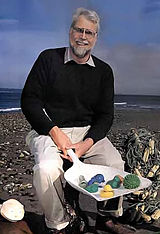KIMO
KIMO Kommunenes Internasjonale Miljøorganisasjon / Local Authorities International Environmental Organization is a Europe-wide network of various actors in marine protection . KIMO campaigns against the pollution of the seas by garbage .
history
The Kommunenes Internasjonale Miljøorganisasjon (Local Authorities International Environmental Organization) (KIMO) was founded in Esbjerg , Denmark in August 1990 with the aim of protecting the seas of Northern Europe against harmful influences and restoring their health. First, Scottish and Dutch port cities joined forces to take political action against the problem of litter on their coasts. KIMO started on the initiative of just four actors. Today over 120 municipalities, nature conservation organizations and state authorities participate in the network.
Today KIMO unites members in Belgium , the United Kingdom , Norway , Sweden , Denmark, Germany , the Faroe Islands , the Netherlands, the Republic of Ireland and the Isle of Man (associate member). In total, KIMO represents over six million people.
target

Garbage in the sea pollutes the life of plants and animals in the sea and that of the people by the sea. Fishing and tourism are grappling with the problem of litter on the fringes and in the nets. KIMO would like to use educational work and various campaigns to persuade the polluters, sometimes the fishermen themselves, to act differently. Politically, KIMO tries z. B. to influence the OPSAR conference and thus the legislation of the neighboring states through lobbying . Scientific studies on garbage in the sea are supported by KIMO.
Actions
International Coastal Cleanup Day
On the “International Coastal Cleanup Day”, every third Saturday in September, hundreds of thousands of nature conservationists all over the world meet to clean up coasts, bodies of water and river banks of dangerous waste. In 2010, for the first time, NABU activists in Germany took part in the collection campaign as part of the NABU project “Oceans without Plastic”, which was launched in September 2010.
Fishing for litter

Fishing for Litter is an initiative to effectively reduce litter in the sea. In the North Sea, 20,000 tons of waste are disposed of every year. Fishermen sometimes find large amounts of waste in their nets, mostly depending on the fishing area and the fishing technique used. An environmentally friendly disposal of this waste often does not take place. Most of the time, the fishing vessels are not equipped to store the waste. On the other hand, the options for waste separation and disposal in many ports along the European coasts are inadequate, inconsistent and usually chargeable. The result is that fished garbage is often thrown back into the sea. KIMO tries to “fish for rubbish” together with the fishing industry. The local fishermen are given the capacities for good waste disposal on land. This is to ensure that rubbish that gets caught in the nets does not end up in the sea again.
The project started in Scotland in 2005. The simple idea quickly spread to fishermen and port authorities beyond Scotland. One of the goals of KIMO is to establish the campaign in the ports of the Baltic Sea. The project is now being carried out successfully in around 100 European municipalities.
KIMO in Germany
In September 2010, NABU started the “Seas without plastic” project. In 2010, NABU also joined KIMO and organized the international Costal Cleanup Day on the German coasts for the first time with its groups .
As part of the Fishing for Litter campaign, NABU would like to help establish regional structures for effective waste disposal in selected ports on the North and Baltic Sea coasts. To this end, it develops appropriate projects in cooperation with fishermen, regional waste disposal companies and the relevant federal and state authorities.
See also
swell
- ↑ Coastal Cleanup Day - NABU cleans up . NABU. Retrieved September 8, 2019.
- ↑ Fishing For Litter ( Memento of the original from May 13, 2011 in the Internet Archive ) Info: The archive link was inserted automatically and has not yet been checked. Please check the original and archive link according to the instructions and then remove this notice. , KIMO.
- ↑ Fishing for Litter , NABU.
Web links
- KIMO website (English)